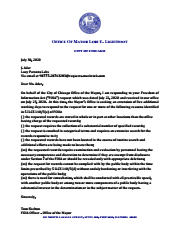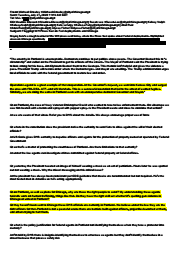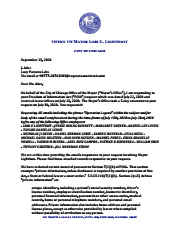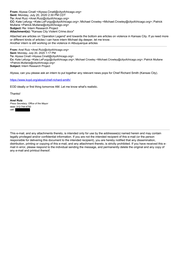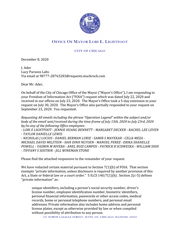FOIA - Chicago Mayor’s Office - Operation Legend
| Submitted | July 22, 2020 |
MuckRock users can file, duplicate, track, and share public records requests like this one. Learn more.
Communications
From: J Ader
To Whom It May Concern:
Pursuant to the Illinois Freedom of Information Act., I hereby request the following records:
All emails including the phrase “Operation Legend” within the subject and/or body of the email sent/received during the time-frame of July 15th, 2020 to July 23rd, 2020 by/to any of the following Office employees:
- LORI E LIGHTFOOT
- JENNIE HUANG BENNETT
- MARGARET DECKER
- RACHEL LEE LEVEN
- TAYLOR DANIELLE LEWIS
- NICHOLAS J LUCIUS
- DANIEL BERMAN LURIE
- SAMIR S MAYEKAR
- CELIA MEZA
- MICHAEL DAVID MILSTEIN
- HAN DINH NGYUEN
- MANUEL PEREZ
- ERIKA SHANELLE POWELL
- YASMIN M RIVERA
- ANEL RUIZ CAMPOS
- PATRICK R SCHWESKA
- WILLIAM SHIH
- TIFFANY S SOSTRIN
- JILL WINEMAN STONE
The requested documents will be made available to the general public, and this request is not being made for commercial purposes.
In the event that there are fees, I would be grateful if you would inform me of the total charges in advance of fulfilling my request. I would prefer the request filled electronically, by e-mail attachment if available or CD-ROM if not.
Thank you in advance for your anticipated cooperation in this matter. I look forward to receiving your response to this request within 5 business days, as the statute requires.
Sincerely,
J Ader
From: Muckrock Staff
To Whom It May Concern:
I wanted to follow up on the following Illinois Freedom of Information Act. request, copied below, and originally submitted on July 22, 2020. Please let me know when I can expect to receive a response.
Thanks for your help, and let me know if further clarification is needed.
From: Mayor's Office
July 30, 2020
J. Ader
Lucy Parsons Labs
Via email at requests@muckrock.com
Dear Mr. Ader,
On behalf of the City of Chicago Office of the Mayor, I am responding to your Freedom of Information Act (“FOIA”) request which was dated July 22, 2020 and received in our office on July 23, 2020. At this time, the Mayor’s Office is seeking an extension of five additional working days to respond to the request for one or more of the following reasons identified in 5 ILCS 140/3(e) of FOIA:
( ) the requested records are stored in whole or in part at other locations than the office having charge of the requested records;
( ) the request requires the collection of a substantial number of specified records;
( ) the request is couched in categorical terms and requires an extensive search for the records responsive to it;
( ) the requested records have not been located in the course of routine search and additional efforts are being made to locate them;
(xx) the requested records require examination and evaluation by personnel having the necessary competence and discretion to determine if they are exempt from disclosure under Section 7 of the FOIA or should be revealed only with appropriate deletions;
(xx) the request for records cannot be complied with by the public body within the time limits prescribed by 5 ILCS 140/3(d) without unduly burdening or interfering with the operations of the public body;
(xx) there is need for consultation, which shall be conducted with all practicable speed, with another public body or among two or more components of a public body having a substantial interest in the determination or in the subject matter of the request.
Sincerely,
Tom Skelton
FOIA Officer – Office of the Mayor
From: Muckrock Staff
To Whom It May Concern:
I wanted to follow up on the following Illinois Freedom of Information Act. request, copied below, and originally submitted on July 22, 2020. Please let me know when I can expect to receive a response.
Thanks for your help, and let me know if further clarification is needed.
From: Mayor's Office
Hi Mr. Ader,
We have a backlog of FOIA requests. I am trying my best to keep up with everything, but there is a lot of work to do, and it is hard to give a firm date when I can complete a request. We will be responding to this request like we have for your other requests these last few months. It was not unduly burdensome, but it is still at least a few hundred pages of emails to review. Let me know if you have any other questions.
Sincerely,
Tom Skelton
FOIA Officer
City of Chicago – Mayor’s Office, Department of Law
121 N. LaSalle St. #502
Chicago, IL 60602
(312) 744-3844
Thomas.skelton@cityofchicago.org
From: Muckrock Staff
To Whom It May Concern:
I wanted to follow up on the following Illinois Freedom of Information Act. request, copied below, and originally submitted on July 22, 2020. Please let me know when I can expect to receive a response.
Thanks for your help, and let me know if further clarification is needed.
From: Muckrock Staff
To Whom It May Concern:
I wanted to follow up on the following Illinois Freedom of Information Act. request, copied below, and originally submitted on July 22, 2020. Please let me know when I can expect to receive a response.
Thanks for your help, and let me know if further clarification is needed.
From: Mayor's Office
Hi Mr. Ader,
This one is close to being finished. Sorry for the delay. Let me know if you have any question.
Sincerely,
Tom Skelton
FOIA Officer
City of Chicago – Mayor’s Office, Department of Law
121 N. LaSalle St. #502
Chicago, IL 60602
(312) 744-3844
Thomas.skelton@cityofchicago.org
From: Mayor's Office
Hi Mr. Ader,
I am going to send the responsive records for this request involving the Mayor. We are working on the rest of the request and should be able to send it soon. Let me know if you have any questions.
Sincerely,
Tom Skelton
FOIA Officer
City of Chicago – Mayor’s Office, Department of Law
121 N. LaSalle St. #502
Chicago, IL 60602
(312) 744-3844
Thomas.skelton@cityofchicago.org
From: Mayor's Office
September 23, 2020
J. Ader
Lucy Parsons Labs
Via email at requests@muckrock.com
Dear Mr. Ader,
On behalf of the City of Chicago Office of the Mayor (“Mayor’s Office”), I am responding to your Freedom of Information Act (“FOIA”) request which was dated July 22, 2020 and received in our offices on July 23, 2020. The Mayor’s Office took a 5-day extension to your request on July 30, 2020. You requested:
Requesting All emails including the phrase “Operation Legend” within the subject and/or body of the email sent/received during the time-frame of July 15th, 2020 to July 23rd, 2020 by/to any of the following Office employees:
- LORI E LIGHTFOOT - JENNIE HUANG BENNETT - MARGARET DECKER - RACHEL LEE LEVEN - TAYLOR DANIELLE LEWIS
- NICHOLAS J LUCIUS - DANIEL BERMAN LURIE - SAMIR S MAYEKAR - CELIA MEZA - MICHAEL DAVID MILSTEIN - HAN DINH NGYUEN - MANUEL PEREZ - ERIKA SHANELLE POWELL - YASMIN M RIVERA - ANEL RUIZ CAMPOS - PATRICK R SCHWESKA - WILLIAM SHIH - TIFFANY S SOSTRIN - JILL WINEMAN STONE
We are at this time providing the emails responsive to your request involving Mayor Lightfoot. Please find those attached records responsive to your request.
We have redacted certain material pursuant to Section 7(1)(b) of FOIA. That section exempts “private information, unless disclosure is required by another provision of this Act, a State or federal law or a court order.” 5 ILCS 140/7(1)(b). Section 2(c-5) defines “private information" as:
unique identifiers, including a person's social security number, driver's license number, employee identification number, biometric identifiers, personal financial information, passwords or other access codes, medical records, home or personal telephone numbers, and personal email addresses. Private information also includes home address and personal license plates, except as otherwise provided by law or when compiled without possibility of attribution to any person.
5 ILCS 140/2(c-5). The material we have redacted under this section is personal cell phone numbers, personal email addresses, and home addresses. Because these items are specifically exempted under Section 7(1)(b), they have been properly redacted.
We have redacted certain material pursuant to Section 7(1)(c) of FOIA. That section exempts:
[p]ersonal information contained within public records, the disclosure of which would constitute a clearly unwarranted invasion of personal privacy, unless the disclosure is consented to in writing by the individual subjects of the information. ‘Unwarranted invasion of personal privacy’ means the disclosure of information that is highly personal or objectionable to a reasonable person and in in which the subject’s right of privacy outweighs any legitimate public interest in obtaining the information. The disclosure of information that bears on the public duties of public employees and officials shall not be considered an invasion of personal privacy.
We have redacted under Section 7(1)(c) City issued cell phones and certain City issued email addresses. As publicly-available City issued cell phones and certain City issued email addresses would subject these employees to invasive and unsolicited communications, the disclosure of this information would burden employees’ privacy interest. Additionally, the access to this information would not advance the public interest in understanding “the affairs of government and the official acts and policies of those who represent them[.]” 5 ILCS 140/1. Further, the landline numbers and other email addresses for these employees is available to the public, which further limits the de minimis public interest in the contact information of the requested employees. See Shurtleff v. United States Environmental Protection Agency, 991 F. Supp. 2d 1, 18 (D.D.C. Sept. 30, 2013) (“The EPA has proferred a substantial privacy interest at stake in disclosing the official internal email address of the EPA Administrator and the work email address of employees at the EOP: these few individuals have ‘a significant personal interest in preventing the burden of unsolicited emails and harassment.’”); Buckovetz v. U.S. Department of the Navy, Case No. 14-cv-2115-BEN, 2016 WL 4801335 at *2-3 (S.D. Cal. Apr. 7, 2016) (affirming the redaction of an employee’s cell phone number, because “the [employee’s] privacy rights in this information outweigh the public’s interest in disclosure”).”
We have redacted and withheld certain material pursuant to Section 7(1)(f) of FOIA. That section exempts:
Preliminary drafts, notes, recommendations, memoranda and other records in which opinions are expressed, or policies or actions are formulated, except that a specific record or relevant portion of a record shall not be exempt when the record is publicly cited and identified by the head of the public body.
5 ILCS 140/7(1)(f). The U.S. Supreme Court has determined that the deliberative process exemption under FOIA focuses on documents that reflect “advisory opinions, recommendations and deliberations comprising part of a process by which governmental decisions and policies are formulated.” NLRB v. Sears and Roebuck, 421 U.S. 132, 150-151 (1975). The purpose is to encourage “frank discussion of legal or policy matters” such that employees in government feel free to express their opinions before a final legal or policy decision is made. “Deliberative” has been found to mean being a direct part of the process where recommendations and opinions are expressed. Vaughn v. Rosen, 523 F.2d 1136, 1143-44 (D.C. Cir. 1975). Records where preliminary opinions are expressed and policies and actions are formulated are therefore exempt from production under Section 7(1)(f) of the Illinois FOIA, and have been properly redacted and withheld.
You have the right to have a denial reviewed by the Public Access Counselor (PAC) at the Office of the Illinois Attorney General, 500 S. 2nd Street, Springfield, Illinois 62706, (877) 299-3642. You also have the right to seek judicial review of your denial by filing a lawsuit in Cook County Circuit Court.
Sincerely,
Tom Skelton
FOIA Officer – Mayor’s Office
From: Mayor's Office
December 8, 2020
J. Ader
Lucy Parsons Labs
Via email at requests@muckrock.com
Dear Mr. Ader,
On behalf of the City of Chicago Office of the Mayor (“Mayor’s Office”), I am responding to your Freedom of Information Act (“FOIA”) request which was dated July 22, 2020 and received in our offices on July 23, 2020. The Mayor’s Office took a 5-day extension to your request on July 30, 2020. The Mayor’s Office also partially responded to your request on September 23, 2020. You requested:
Requesting All emails including the phrase “Operation Legend” within the subject and/or body of the email sent/received during the time-frame of July 15th, 2020 to July 23rd, 2020 by/to any of the following Office employees:
- LORI E LIGHTFOOT - JENNIE HUANG BENNETT - MARGARET DECKER - RACHEL LEE LEVEN - TAYLOR DANIELLE LEWIS
- NICHOLAS J LUCIUS - DANIEL BERMAN LURIE - SAMIR S MAYEKAR - CELIA MEZA - MICHAEL DAVID MILSTEIN - HAN DINH NGYUEN - MANUEL PEREZ - ERIKA SHANELLE POWELL - YASMIN M RIVERA - ANEL RUIZ CAMPOS - PATRICK R SCHWESKA - WILLIAM SHIH - TIFFANY S SOSTRIN - JILL WINEMAN STONE
Please find the attached responsive to the remainder of your request.
We have redacted certain material pursuant to Section 7(1)(b) of FOIA. That section exempts “private information, unless disclosure is required by another provision of this Act, a State or federal law or a court order.” 5 ILCS 140/7(1)(b). Section 2(c-5) defines “private information" as:
unique identifiers, including a person's social security number, driver's license number, employee identification number, biometric identifiers, personal financial information, passwords or other access codes, medical records, home or personal telephone numbers, and personal email addresses. Private information also includes home address and personal license plates, except as otherwise provided by law or when compiled without possibility of attribution to any person.
5 ILCS 140/2(c-5). The material we have redacted under this section is personal cell phone numbers, personal email addresses, and home addresses. Because these items are specifically exempted under Section 7(1)(b), they have been properly redacted.
We have redacted certain material pursuant to Section 7(1)(c) of FOIA. That section exempts:
[p]ersonal information contained within public records, the disclosure of which would constitute a clearly unwarranted invasion of personal privacy, unless the disclosure is consented to in writing by the individual subjects of the information. ‘Unwarranted invasion of personal privacy’ means the disclosure of information that is highly personal or objectionable to a reasonable person and in in which the subject’s right of privacy outweighs any legitimate public interest in obtaining the information. The disclosure of information that bears on the public duties of public employees and officials shall not be considered an invasion of personal privacy.
We have redacted under Section 7(1)(c) City issued cell phones and certain City issued email addresses. As publicly-available City issued cell phones and certain City issued email addresses would subject these employees to invasive and unsolicited communications, the disclosure of this information would burden employees’ privacy interest. Additionally, the access to this information would not advance the public interest in understanding “the affairs of government and the official acts and policies of those who represent them[.]” 5 ILCS 140/1. Further, the landline numbers and other email addresses for these employees is available to the public, which further limits the de minimis public interest in the contact information of the requested employees. See Shurtleff v. United States Environmental Protection Agency, 991 F. Supp. 2d 1, 18 (D.D.C. Sept. 30, 2013) (“The EPA has proferred a substantial privacy interest at stake in disclosing the official internal email address of the EPA Administrator and the work email address of employees at the EOP: these few individuals have ‘a significant personal interest in preventing the burden of unsolicited emails and harassment.’”); Buckovetz v. U.S. Department of the Navy, Case No. 14-cv-2115-BEN, 2016 WL 4801335 at *2-3 (S.D. Cal. Apr. 7, 2016) (affirming the redaction of an employee’s cell phone number, because “the [employee’s] privacy rights in this information outweigh the public’s interest in disclosure”).”
We have redacted and withheld certain material pursuant to Section 7(1)(f) of FOIA. That section exempts:
Preliminary drafts, notes, recommendations, memoranda and other records in which opinions are expressed, or policies or actions are formulated, except that a specific record or relevant portion of a record shall not be exempt when the record is publicly cited and identified by the head of the public body.
5 ILCS 140/7(1)(f). The U.S. Supreme Court has determined that the deliberative process exemption under FOIA focuses on documents that reflect “advisory opinions, recommendations and deliberations comprising part of a process by which governmental decisions and policies are formulated.” NLRB v. Sears and Roebuck, 421 U.S. 132, 150-151 (1975). The purpose is to encourage “frank discussion of legal or policy matters” such that employees in government feel free to express their opinions before a final legal or policy decision is made. “Deliberative” has been found to mean being a direct part of the process where recommendations and opinions are expressed. Vaughn v. Rosen, 523 F.2d 1136, 1143-44 (D.C. Cir. 1975). Records where preliminary opinions are expressed and policies and actions are formulated are therefore exempt from production under Section 7(1)(f) of the Illinois FOIA, and have been properly redacted and withheld.
We have redacted certain material pursuant to Section 7(1)(m) of FOIA. That section exempts:
Communications between a public body and an attorney or auditor representing the public body that would not be subject to discovery in litigation, and materials prepared or compiled by or for a public body in anticipation of a criminal, civil or administrative proceeding upon the request of an attorney advising the public body, and materials prepared or compiled with respect to internal audits of public bodies.
5 ILCS 140/7(1)(m). Because the redacted records constituted privileged communications between an attorney and clients, they have been properly redacted under this section.
We have also redacted records under Section 7(1)(m) and the work product doctrine. “The work product doctrine applies to documents prepared by either client or attorney in anticipation of litigation or trial.” Dalen v. Ozite Corp., 230 Ill. App. 3d, 18, 27 (2d Dist. 1992); see also Mattenson v. Baxter Healthcare Corp., 438 F.3d 763, 767-68 (7th Cir. 2006). Under this doctrine, such material “‘is subject to discovery only if it does not contain or disclose the theories, mental impressions, or litigation plans of the party’s attorney.’” Center Partners, Ltd. v. Growth Head GP, LLC, 2012 IL 113107, ¶ 29 (quoting Ill. S. Ct. R. 201(b)(2)). Because the redacted records would reveal the mental impressions or litigation plans of City attorneys, they have been properly redacted under Section 7(1)(m) and the work product doctrine.
You have the right to have a denial reviewed by the Public Access Counselor (PAC) at the Office of the Illinois Attorney General, 500 S. 2nd Street, Springfield, Illinois 62706, (877) 299-3642. You also have the right to seek judicial review of your denial by filing a lawsuit in Cook County Circuit Court.
Sincerely,
Tom Skelton
FOIA Officer – Mayor’s Office
Files
pages
